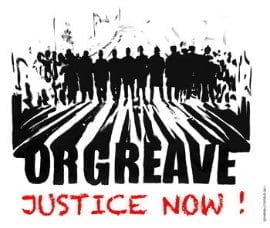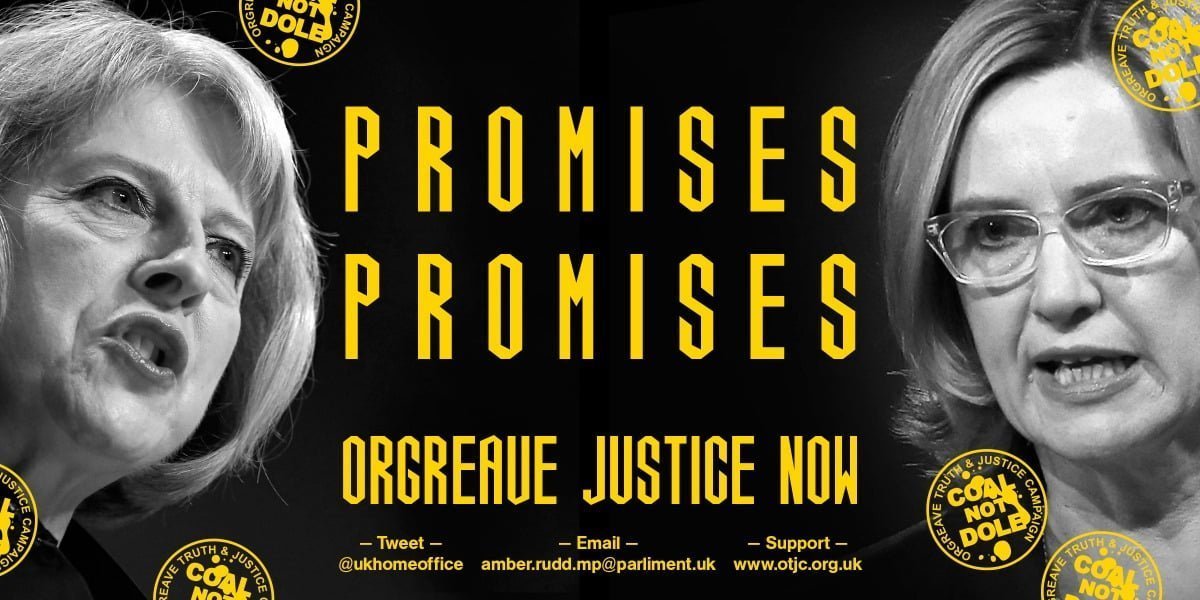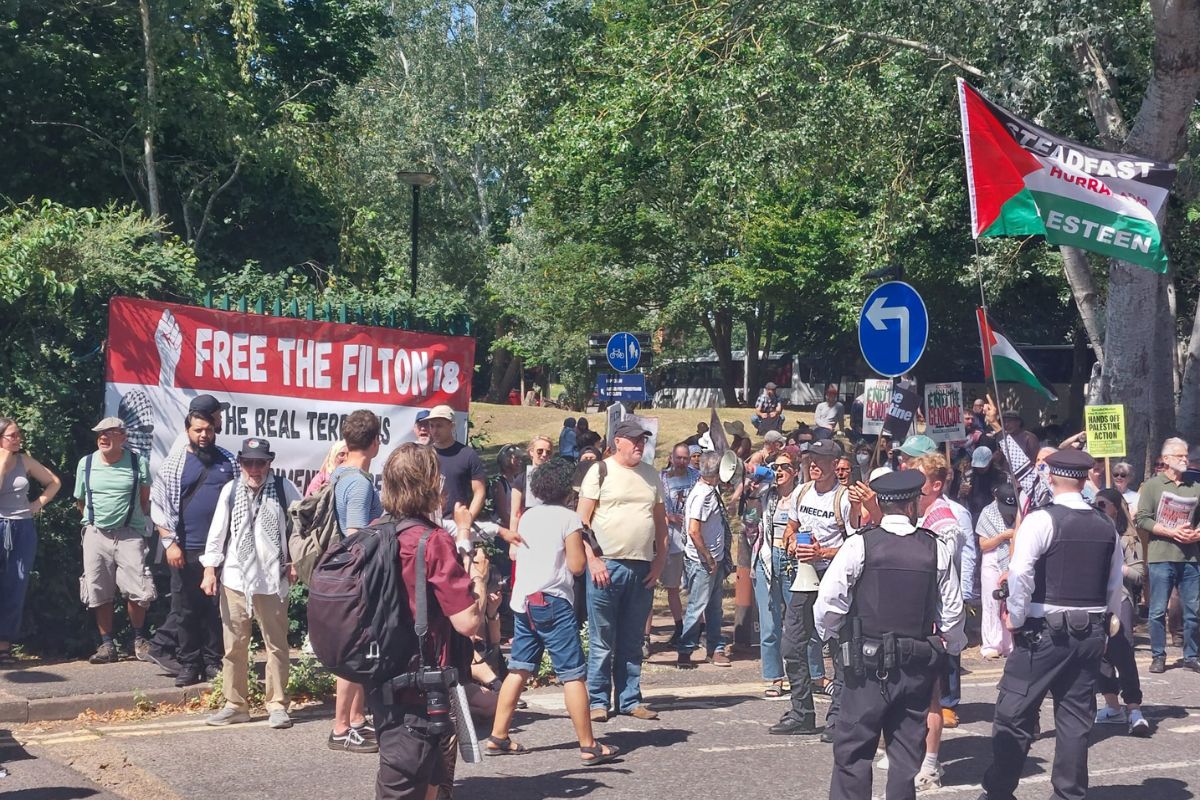After many years of campaigning from the labour movement and local communities, Conservative Party home secretary, Amber Rudd, this week announced that there would be no inquiry into the brutal events at the Orgreave coking works in June 1984. The Tories’ refusal to hold an inquiry shines a light on the scandalous role played by the whole rotten Establishment over the Battle of Orgreave.
After many years of campaigning from the labour movement and local communities, Conservative Party home secretary, Amber Rudd, this week scandalously dropped the bombshell that there would be no inquiry into the brutal events at the Orgreave coking works in South Yorkshire in June 1984.
The violence used by the police at Orgreave at that time, and the subsequent state propaganda, played a crucial role in defeating the National Union of Miners (NUM) and its leader Arthur Scargill during the Miners’ Strike.
The decision not to hold an inquiry has even been criticised by current South Yorkshire Police and Crime Commissioner, Dr Alan Billings, who said that he was “shocked and dismayed” and that “former miners and their families deserve to know the truth about what happened that day”.
It is questionable whether this intervention by Dr Billings is more influenced by the reputational damage already suffered by the South Yorkshire police as a result of the recent Hillsborough Inquests, or by the next Police and Crime Commissioner election, or by a genuine concern about the police’s behaviour at Orgreave. Nevertheless, his comments demonstrate the level of anger at the decision within South Yorkshire.
No alarms and no surprises
The decision by the Tory home secretary not to hold an inquest comes as no surprise. While previous home secretary (and current prime minister) Theresa May and Rudd herself had previously misled campaigners about the possibility of an inquiry being held, the facts that are already known about the events at Orgreave make it completely unsurprising. Even David Hart, the advisor to Margaret Thatcher and the National Coal Board, admitted that “it was a battle ground of our own choosing. It was a set-up, and it worked brilliantly”. The current Conservative Party are aware of the damning revelations that would have been uncovered about their own party if they had agreed to hold an inquiry.
The context of the infamous Battle of Orgreave is the politically motivated closure of Britain’s coal mining industry. The Thatcher government wanted to break the back of the labour movement and remove the influence of the militant trade union, the NUM, and so attempted to destroy the coal industry and make the NUM’s members unemployed. The Thatcher government knew that winning its fight against the working class relied on sending a message that resistance would be immediately and brutally crushed. It has already been shown that many lies were told to discredit the miners, and Arthur Scargill in particular, but the revelations that would have come to light with an Orgreave inquiry would have threatened the entire reputation of the Tory Party and the wider Establishment.
The Battle of Orgreave
 The day of the Battle of Orgreave was 18th June 1984. The NUM had picketed the works at Orgreave to try and prevent the delivery of coke from the plant, and in turn to put further pressure on the government. The ensuing reaction from the police was brutal. Hundreds of police, heavily armed with truncheons and mounted on horses, attacked the picketers; 51 picketers were injured, along with 72 police officers, and 93 picketers were arrested. In the end, 95 picketers were charged with the offence of riot which meant they faced a maximum sentence of life imprisonment. The trials collapsed amid evidence that police statements were either false or had been altered to ensure they matched the ‘official’ version of events. While 39 of the 95 received £425,000 in compensation, no police officers have ever been criminally charged for either assault or perjury.
The day of the Battle of Orgreave was 18th June 1984. The NUM had picketed the works at Orgreave to try and prevent the delivery of coke from the plant, and in turn to put further pressure on the government. The ensuing reaction from the police was brutal. Hundreds of police, heavily armed with truncheons and mounted on horses, attacked the picketers; 51 picketers were injured, along with 72 police officers, and 93 picketers were arrested. In the end, 95 picketers were charged with the offence of riot which meant they faced a maximum sentence of life imprisonment. The trials collapsed amid evidence that police statements were either false or had been altered to ensure they matched the ‘official’ version of events. While 39 of the 95 received £425,000 in compensation, no police officers have ever been criminally charged for either assault or perjury.
While the police riot would have been disgraceful enough in its own right, the media also tried to turn public opinion against the miners. It is unsurprising that the openly right-wing newspapers would attempt to lay the blame at the feet of the picketers and claim the police were acting in self-defence. But the role of the BBC shows how the campaign was not simply one by the South Yorkshire police – it was an operation involving the entire state apparatus. The evening news showed miners throwing stones and then the police charging them, when in reality the events happened in the opposite way. The BBC later admitted that it, “made a mistake over the sequence of events at Orgreave. We accepted without question that it was serious, but emphasised that it was a mistake made in the haste of putting the news together. The end result was that the editor inadvertently reversed the occurrence of the actions of the police and the pickets.” The BBC also neglected to film a picketer being attacked by a police officer while offering no resistance, which they later blamed on a “camera error”.
There have been calls for an inquiry into the events at Orgreave ever since the riot trial collapsed. These calls have further intensified in recent months as a result of more statements from those involved in the riot. Last year the (so-called) Independent Police Complaints Commission (IPCC) concluded that there was “evidence of excessive violence by police officers, a false narrative from police exaggerating violence by miners, perjury by officers giving evidence to prosecute the arrested men, and an apparent cover-up of that perjury by senior officers.” In September of this year, a sergeant at Orgreave (Mike Freeman) claimed that those officers who made arrests were made to sign statements that had been prepared by other officers who had not been at Orgreave. Another (unnamed) officer claimed that senior officers had said that they were “anticipating trouble and in some ways relishing it and looking forward to it” and that police officers were ordered to charge “a largely peaceful crowd”.
The system is broken
Any person looking at this evidence will realise that any inquiry would be highly embarrassing, not only for South Yorkshire Police, but also for the Conservative Party and the whole Establishment. We support the determined efforts of the Orgreave Truth and Justice Campaign to do just that: reveal the truth and fight for justice.
But an inquiry alone will not be able to provide justice for the miners. An inquiry would simply be one section of the ruling class investigating another, which (at best) would result in Orgreave being put down to rogue police officers and irresponsible government ministers. But the police riot at Orgreave was the work of the whole state apparatus; the government, police, and media working in tangent to crush the working class and the most militant sections of the labour movement. Similar events and state tactics were seen later in the same decade in the case of the Wapping print strike and the Hillsborough disaster. The police, press, and politicians, meanwhile, have been embroiled in all manner of scandals ever since. It is clear that this is not a case of a few bad apples – the whole capitalist Establishment is rotten.
The events at Orgreave must be understood as being systematic of an Establishment that has been reinforced over centuries to protect the interests of the ruling class. The police, media and government will continue to act in tangent while they remain a force to protect these class interests. The fight for the truth about Orgreave must continue – alongside the fight against capitalism and the elite who defend this oppressive and exploitative system, which led to one of the greatest injustices in the history of the British labour movement.







